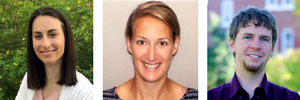
Six Graduate Student Groups Receive Interdisciplinary D-SIGN Grants
The Office of the Vice Provost for Interdisciplinary Studies has awarded Duke Support for Interdisciplinary Graduate Networks (D-SIGN) grants to six graduate student groups for the 2017-2018 academic year.
Desarrolla México

- Student organizers: Ruxandra Popovici, Ph.D. in Environment, Nicholas School of the Environment; Emilio Blanco Gonzalez and Adam Cullen, Master of Engineering in Mechanical Engineering, Pratt School of Engineering
- Faculty sponsor: Elizabeth Shapiro-Garza
Desarrolla México is one of five projects developed by Duke Desarrolla. This group will conduct a summer project in Ejido Playa Grande, helping a rural community develop a renewable energy strategy and a formal business plan for its environmentally sustainable ecotourism business. In doing so, the group aims to promote a consultant-based approach to international development, connecting community members to business, marketing and engineering experts who can help them reach their particular business goals. This project is part of a research study on the obstacles faced by rural residents when attempting to reinvest funds received from Payments for Ecosystem Services programs into a community business. (See update.)
Global Energy Access Network (GLEAN)

- Student organizers: Yating Li, Ph.D. in Environmental Policy, Nicholas School of the Environment and Sanford School of Public Policy; Muye Ru, Ph.D. in Earth and Ocean Sciences, Nicholas School of the Environment; Faraz Usmani, Ph.D. in Environmental Policy, Nicholas School of the Environment and Sanford School of Public Policy; Heidi Vreeland, Ph.D. in Civil and Environmental Engineering, Pratt School of Engineering
- Faculty sponsors: Subhrendu Pattanayak, Brian Murray
GLEAN includes more than 50 graduate and professional students from across Duke. The group received a D-SIGN grant last year and will use this follow-on grant to elevate the prominence of the global energy access challenge on campus; foster an interdisciplinary community of graduate and professional students wanting to engage with this challenge in their work; and offer opportunities to this community to do so. Activities will include an energy access and air quality survey, engagement with two keynote speakers, case studies on energy and development and an “Imagine Energy” photo contest and exhibition. (See update.)
The Global South after 2010

- Student organizers: Renee Ragin, Ph.D. in Literature, Arts & Sciences; Giulia Ricco, Ph.D. in Romance Studies, Arts & Sciences
- Faculty sponsors: Deborah Jenson, miriam cooke
This group will explore the aesthetics, ethics and politics of transnational violence in the Global South. Are there systematic trends in the types of sociopolitical violence that have characterized social movements after the Arab Spring? How has this violence been represented in the media and in popular culture? What are the legal and political consequences of such representations? Activities will include three seminars with guest facilitators and a graduate student conference. Student participants will come from humanities and social science programs in the Graduate School, as well as from Fuqua, Sanford and Law. The organizers aim to create an edited anthology at the conclusion of this working group. (See update.)
Lowndes County Sanitation Access Network

- Student organizers: Emily Meza, Master of Environmental Management, Nicholas School of the Environment; Katy Hansen, Ph.D. in Environmental Policy, Nicholas School of the Environment and Sanford School of Public Policy; Ryan Juskus, Ph.D. in Religion, Arts & Sciences
- Faculty sponsors: Erika Weinthal, Elizabeth Albright
Students from Divinity, Law, Nicholas, Pratt and Sanford will undertake a community-based research project to improve wastewater treatment in Lowndes County, Alabama, where 90% of households have inadequate or no access to sanitation. More than 80% of households cannot connect to the municipal sewerage and must finance their own septic systems. With a median household income among the lowest in the U.S., many households cannot afford to do so. In addition, half of the septic systems are failing. Poor sanitation poses serious health risks (including hookworm, found in fecal samples from Lowndes County residents). The group will take the lead in diagnosing the interlaced physical, financial, legal and political barriers to sanitation access and evaluate potential solutions. (See update.)
Modeling Health & Environment Graduate Working Group

- Student organizers: Shashika Bandara, Master of Science in Global Health, Duke Global Health Institute; Varun Mallampalli, Ph.D. in Civil and Environmental Engineering, Pratt School of Engineering
- Faculty sponsors: Kevin A. Schulman, Mark Borsuk
A working group of graduate students from diverse backgrounds will design a course for undergraduates on systems thinking and modeling in health and environment. Graduate students with backgrounds in energy, environmental studies and health will collaboratively develop instructional models based on real-world case studies that will serve as course materials for the undergraduate course. Through their interdisciplinary collaboration and the process of contributing to the course, the graduate students will acquire system dynamics modeling skills as well as relevant subject matter knowledge on global health, the environment and the interconnections between the two. (See update.)
Network to Enrich GALS Summer Science Program

- Student organizers: Jacqueline Gerson, Ph.D. in Ecology, Arts & Sciences; Emily Levy, Ph.D. in Biology, Arts & Sciences
- Faculty sponsors: Erika Weinthal, Nicolette Cagle, Naomi Kraut, Megan Mullin
This summer, the Girls on outdoor Adventures in Leadership and Science (GALS) group is piloting a free two-week summer camp for girls aged 15-18 from underrepresented backgrounds to encourage them to pursue STEM fields. The D-SIGN grant will be used to improve the training of GALS leaders and foster a community of environmental educators for a broad array of disciplines. Activities include facilitating interdisciplinary working groups to improve lesson plans and the structure of GALS; expanding resources for GALS leaders and increasing the number of leaders; sharing the curriculum and logistics to encourage similar programs across North Carolina; and creating mentorship programs between Duke students from underserved communities and GALS participants. (See update.)
About D-SIGN
This internal funding mechanism encourages graduate students to explore beyond disciplinary lines, both in research and coursework. The goal is to enable graduate students to build or extend their networks and to integrate collaborative, cross-school experiences into their programs, thereby increasing the number of individuals whose graduate training reflects Duke’s commitment to interdisciplinarity and knowledge in the service of society.
A January 2017 RFP invited all current Duke graduate students (including master’s, professional and Ph.D. students) to propose an interdisciplinary project, training or experience lasting up to a year.
Proposals were reviewed by an ad hoc committee convened by the Vice Provost for Interdisciplinary Studies with representation from faculty, institute directors and graduate students.
The first cohort of D-SIGN grantees (2016-2017) included Duke Conservation Society; Global Alliance on Disability and Health Innovation – Children and Adolescents Project; Global Energy Access Network (GLEAN); Rethinking Regulation – Graduate Student Working Group; and A STEM Researcher-Educator Network to Improve K-12 Science Literacy.